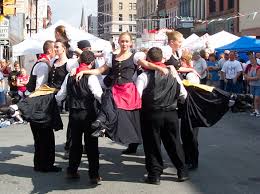Your Guide to Wi-Fi Security
by Con Chapman
Like many “hip” Americans, you may spend time this weekend in an upscale place that serves expensive foamy coffee and offers a public Wi-Fi ”hotspot” where men and women can ogle each other discreetly while pretending to write the Great American Novel.

Internet cafe: “I tried to plug my laptop into this cup of dark roast and now it won't work.”
What does ”Wi-Fi” stand for? Not “your Wife would have a Fit if she knew you were looking at dirty-blonde college girls instead of buying kitchen-size garbage bags, like she asked.”

“Don't look now, but that creepy guy with the laptop is staring at you.”
No, “Wi-Fi” refers to wireless technology that allows you to access the Internet from your laptop without bringing along a cable guy every time you go out for a latte. Due to their open character, however, Wi-Fi hotspots expose you and your computer to serious security breaches that you would prefer to ignore because they are boring and you think that cute guy in the Sherpa hat just winked at you.

Sherpa hats: You'll look stupid in either model.
For your convenience, Gerbil Interactive Media has researched these risks and after two minutes on-line is eminently unqualified to discuss them. Let's get started!
Don't sit next to international crime syndicates: Public Wi-Fi hotspots are easy prey for cybercriminals who survey surrounding network traffic or even set up so-called “evil twin” networks that mimic real hotspots but are used by those two creepy little girls in the Diane Arbus photo. How can you avoid this sort of hazard?

They're both thinking the same thing about you.
Simple. When you take a table at Starbucks, listen for conversations such as the following:

Little Italy: Avoid hotspots here.
TONY “THE HORSE” DE FILIPO: “Hey Nunzio-I told you to get me a cappucino. This is a freakin' light roast coffee of the day, you mook!”
NUNZIO: Boss, I'm sorry . . .
[SOUND OF GUNFIRE]
TONY “THE HORSE” DE FILIPO: Pass me a Sweet ‘n Low, would you?
Set up a personal firewall: A personal firewall can protect your passwords and sensitive personal information such as “People who did not send us a Christmas card this year who are off the list forever.” How can you, a computer illiterate, set up a firewall without making major structural modifications to a business establishment that will close at 7 p.m.? Order the Western Omelette, extra onions.
.jpg)
Encrypt your data: Data encryption can prevent cybercrooks from understanding what you are writing as you tap away at your keyboard, as if anyone could. While years of training or expensive software are ordinarily required to encrypt your data, you can also use “Pig Latin”, a tried-and-true low-tech solution, as follows: “I'm ere-hay at the offee-cay op-shay, en-thay I'm oing-gay oo-tay et-gay my air-hay osted-fray.”

“Ohmygod-some guy in here has on XXL boxer shorts with penguins on them!”
Wear your underwear inside out: For some reason this works! Cybercriminals data-surfing in a “cybercafe” are not looking for the sort of “hotspot” typified by a pair of 48″ waist underpants. Show them your label and watch them turn their attention to the barista with the low-cut jeans and the butterfly tattoo.

“Here's your change, Mister—your change?”
Turn off your computer: Nothing says “Nothing to see here” like someone tapping away at a lap top with a blank screen, iPod earbuds in place, singing Cher's mega-hit “Gypsies, Tramps and Thieves” to no one in particular.

For the complete paranoid schizophrenic effect, shower no more than once a week and put a shopping bag on the seat next to you.
|
2
favs |
1557 views
9 comments |
680 words
All rights reserved. |
Author's Note
The author has not attached a note to this story.
Other stories by Con Chapman
Tags
This story has no tags.
Ah man, Con -- That's a good one! Had me laughing.
yep
Fave, of course!
Are you sure you meant to use that hyphen between "dirty" and "blonde"?
Just asking!
Sheezus!
'Ey, Con. Dat guy botherin' you? About yuh grammuh? You want I should take 'im outside?"
--TONY “THE HORSE” DE FILIPO
I was actually hoping I'd get Vinnie "The Ice Pick" Gravano.
(Tony *does* sound like the first Jewish-Italian mobster. You might want to go with Vinnie...)
This is funny and clever and makes me so happy I am not one of those people who write in overpriced coffee places... I didn't know all this happened, but I am glad that Tony the mobster is trying to cut down on the sugar, with his Sweet 'N Low.
somehow this has the opposite effect on me than on cherise: it makes me want to escape to one of those american places perhaps because we don't have them here. enjoyed though i don't know what to do with my sherpa hat now.